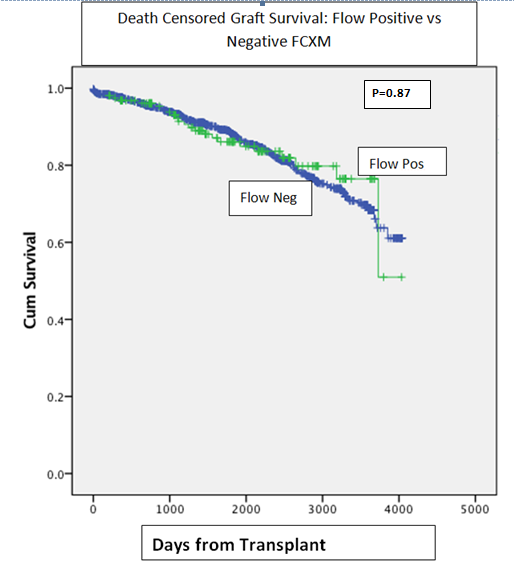High Risk Renal Transplant Recipients on Steroid Free Immunosupression Regimen. Indiana University Experience.
Renal Transplant, Indiana University School of Medicine, Indianapolis, IN
Meeting: 2017 American Transplant Congress
Abstract number: D69
Keywords: High-risk, Kidney transplantation, Rejection
Session Information
Session Name: Poster Session D: Kidney Immunosuppression: Novel Regimens and Drug Minimization
Session Type: Poster Session
Date: Tuesday, May 2, 2017
Session Time: 6:00pm-7:00pm
 Presentation Time: 6:00pm-7:00pm
Presentation Time: 6:00pm-7:00pm
Location: Hall D1
Background : Immunologic risk often influence the choice immunosuppressive regimen used in renal transplant recipient. Patient with positive flow cytometry crossmatch (FCXM) or presence of pre transplant donor specific antibodies (DSA) are often considered high risk with most transplant centers avoiding transplanting these patients or use a more robust immunosuppressive regimen post-transplant.
Method: A retrospective chart review of patients who received a kidney transplant between Jan 1, 2005 and June 31, 2015 with minimal one year follow up. Patients with multi organ transplant were excluded. Patients received anti- thymocyte antibodies with pulse steroid induction (Early five days withdraw) except zero mismatches who received basiliximab. Patients were placed on steroid free two drugs Immunosupression regimen. Donor specific antibodies were checked using single antigen beads ( One Lambda Inc).
Results:2135 patient's kidney alone patients were included in the study over a 10.5 years' period. Mean follow up time was 4.6 years. 157 patients (7.4%) had positive flow cytometry .A total of 195 patients (9.1%) received desensitization treatment either pre transplant or in the perioperative period. Overall one year rejection rate was 17% irrespective of immunologic risk status. One year rejection rate were 27.3% vs 19.3%, p=0.0003 in patient with positive FCXM vs negative FCXM. Similar analysis on patients with history of desensitization vs no desensitization was 35.4% vs 19.16%. p=0.0004 respectively. There were no significant differences in death censored graft failure andn patient survival between the positive FCXM vs negative FCXM (8.3% vs 7.2%, p=0.47 and 8.8% vs 7.2%, p=0.25 respectively) Conclusion : Steroid free maintenance immunosuppression regimen is associated with higher risk of acute rejection in high immunologic risk renal transplant recipient with no significant impact on the intermediate term graft or patient survival.
Conclusion : Steroid free maintenance immunosuppression regimen is associated with higher risk of acute rejection in high immunologic risk renal transplant recipient with no significant impact on the intermediate term graft or patient survival.
CITATION INFORMATION: Adebiyi O, Hussain S, Mishler D, Goggins W, Yaqub M, Taber T, Sharfuddin A. High Risk Renal Transplant Recipients on Steroid Free Immunosupression Regimen. Indiana University Experience. Am J Transplant. 2017;17 (suppl 3).
To cite this abstract in AMA style:
Adebiyi O, Hussain S, Mishler D, Goggins W, Yaqub M, Taber T, Sharfuddin A. High Risk Renal Transplant Recipients on Steroid Free Immunosupression Regimen. Indiana University Experience. [abstract]. Am J Transplant. 2017; 17 (suppl 3). https://atcmeetingabstracts.com/abstract/high-risk-renal-transplant-recipients-on-steroid-free-immunosupression-regimen-indiana-university-experience/. Accessed March 3, 2026.« Back to 2017 American Transplant Congress
